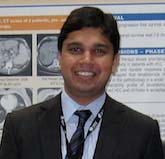Although I have only now started my career in oncology as a first-year fellow, this is not my first experience at the Annual Meeting of the American Society of Clinical Oncology (ASCO). I attended one other time, in 2012, when I was still working as a hospitalist in Rhode Island, where I was fortunate enough to have a poster on hepatocellular carcinoma accepted for poster presentation. Looking back, I remember being overwhelmed by what this meeting had to offer in terms of lectures, poster sessions, and symposiums. Fortunately, my mentor guided me towards what would be the most exciting research presentations that year, including studies in which PD-L1 antibodies were first presented. Although not an oncologist at the time, I felt I had found my calling in medicine.
Two years later, I attended the 2014 meeting as a first-year hematology-oncology fellow; that it was the 50th anniversary of ASCO made it even more of an event. Unlike my first experience, I came prepared, and ASCO’s suite of mobile applications helped me greatly. The iPlanner, which I used on my iPad, was especially helpful in providing easy navigation of sessions and the venue. That I could record sessions for later viewing literally eliminated the stress of “I need to be there.” Though I have attended many meetings, what stood out for me about ASCO is the priority the Society has made to capitalize on digital media. It was truly appreciated.
So, what stands out about the 2014 meeting? For me, it is the continued focus on molecularly targeted anticancer therapy. Since the introduction of the imatinib mesylate for chronic myeloid leukemia, basic and clinical oncologists around the world have increasingly focused their efforts towards finding targetable genetic alterations in cancers, and this was reflected in every presentation I attended at this meeting. For example, the oral abstract session for non-small cell lung cancer was almost exclusively focused on targeted therapies, and it carried over to the poster sessions. For a first year fellow, this is where I believe the future treatment of cancer care will be, throughout the world.
Learning about new results from ongoing clinical trials was important to me in two ways. First, it stimulated me to think of new research ideas to work on over the ensuing year. More importantly, perhaps, it also informed my thinking about the clinical approach to cancer, particularly as it related to the timing of clinical trials. I am now more likely to search for trials after someone has progressed on first-line therapy rather than recommend standard treatment, where historically the results have not been particularly promising. ASCO has taught me to search for clinical trials aggressively, and it is a concept I hope to engrain in my own clinical approach, whether it be as an academician or one who practices in the community.
As I left the ASCO Annual Meeting, it is apparent that ASCO has a strong and sincere commitment to oncology fellows. Whether it be from the low fees for fellows to join ASCO and to register for the Annual Meeting; to access the Fellows’ Lounge, where we could meet and participate in talks geared towards fellows; and to receive discounts for the ASCO University Bookstore—or the accessibility to oncology thought leaders who were willing to meet with us (formally and informally), I came to appreciate all that ASCO had to offer me.
 |


Recent posts